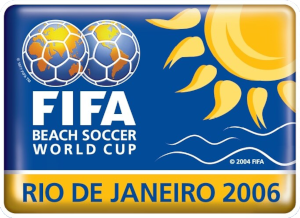
The Brazil national football team, nicknamed Seleção Canarinho, represents Brazil in men's international football and is administered by the Brazilian Football Confederation (CBF), the governing body for football in Brazil. They have been a member of FIFA since 1923 and a member of CONMEBOL since 1916.

The 1970 FIFA World Cup was the 9th edition of the FIFA World Cup, the quadrennial international football championship for men's senior national teams. Held from 31 May to 21 June in Mexico, it was the first World Cup tournament held outside Europe and South America, and also the first held in North America. Teams representing 75 nations from all six populated continents entered the competition, and its qualification rounds began in May 1968. Fourteen teams qualified from this process to join host nation Mexico and defending champions England in the 16-team final tournament. El Salvador, Israel and Morocco made their debut appearances at the final stage.

The Sweden men's national football team represents Sweden in men's international football and it is controlled by the Swedish Football Association, the governing body of football in Sweden. Sweden's home ground is Strawberry Arena in Solna and the team is coached by Jon Dahl Tomasson. From 1945 to the late 1950s, they were considered one of the greatest teams in Europe.

The 2002 FIFA World Cup final was the final match of the 2002 World Cup, the 17th edition of FIFA's competition for national football teams. The match was played at the International Stadium in Yokohama, Japan, on 30 June 2002, and was contested by Germany and Brazil. The tournament comprised hosts Japan and South Korea, holders France, and 29 other teams who emerged from the qualification phase, organised by the six FIFA confederations. The 32 teams competed in a group stage, from which 16 teams qualified for the knockout stage. En route to the final, Germany finished first in Group E, with two wins and a draw, after which they defeated Paraguay in the round of 16, the United States in the quarter-finals and South Korea in the semi-finals. Brazil finished top of Group C with three wins, before defeating Belgium in the round of 16, England in the quarter-final, and Turkey in the semi-final. The final took place in front of 69,029 supporters, with an estimated 1.1 billion watching on television, and was refereed by Pierluigi Collina from Italy.

The 2006 FIFA Beach Soccer World Cup was the second edition of the FIFA Beach Soccer World Cup, governed by FIFA. Overall, this was the 12th edition of a world cup in beach soccer since the establishment of the Beach Soccer World Championships which ran from 1995–2004 but was not governed by FIFA. It took place in Rio de Janeiro, Brazil, from 2–12 November 2006.
The term "last-minute goal" is used in sport, primarily association football, to describe a goal scored very late in a game, usually one that affects the outcome of the game. The definition of a "last-minute goal" commonly used is one scored either in the final or penultimate minute of regulation time or extra time, or during stoppage time or injury time.

The 2008 FIFA Beach Soccer World Cup was the fourth edition of the FIFA Beach Soccer World Cup, governed by FIFA. Overall, this was the 14th edition of a world cup in beach soccer since the establishment of the Beach Soccer World Championships which ran from 1995–2004 but was not governed by FIFA. It took place in Marseille, France, in the Plages du Prado from 17 to 27 July 2008. It was the first tournament to take place outside Brazil.

The England national football team did not enter the first three FIFA World Cup tournaments but have entered all 19 subsequent ones, beginning with that of 1950. They have failed to qualify for the finals on three occasions – 1974, 1978 (Argentina) and 1994 – and have failed to advance from the group stage on three occasions: in 1950, 1958 and 2014. Their best performance is winning the cup as the host nation in 1966; they also finished in fourth place in 1990 in Italy, and in 2018 in Russia. Other than these, the team have also reached the quarter-finals on seven other occasions, the latest of which was in 2022 in Qatar.

The Brazil national under-23 football team represents Brazil in international football competitions during Olympic Games and Pan American Games. The selection is limited to players under the age of 23, except three overage players. The team is controlled by the Brazilian Football Confederation (CBF). Brazil U23 is one of the most successful teams in the Olympic football tournament, having won it twice and securing a record total of seven medals, including two golds, three silvers, and two bronzes.

The 2010 FIFA World Cup final was the final match of the 2010 World Cup, the 19th edition of FIFA's competition for national football teams. The match was played at Soccer City in Johannesburg, South Africa, on 11 July 2010, and was contested by the Netherlands and Spain. The event comprised hosts South Africa and 31 other teams who emerged from the qualification phase, organised by the six FIFA confederations. The 32 teams competed in a group stage, from which 16 teams qualified for the knockout stage. En route to the final, the Netherlands finished first in Group E, with three wins, after which they defeated Slovakia in the round of 16, Brazil in the quarter-final and Uruguay in the semi-final. Spain finished top of Group H with two wins and one loss, before defeating Portugal in the round of 16, Paraguay in the quarter-final and Germany in the semi-final. The final took place in front of 84,490 supporters, with more than 909 million watching on television, and was refereed by Howard Webb from England.
The 2009 FIFA Beach Soccer World Cup Final took place between Switzerland and Brazil on 22 November 2009 at Jumeirah Beach, Dubai. Brazil were the winners, winning by ten goals to five. Brazil have beaten fifteen other teams to be crowned FIFA Beach Soccer World Cup 2009 Winners. It was Brazil's fourth title in a row.
The 2007 FIFA Beach Soccer World Cup Final took place between Mexico and Brazil on 11 November 2007 at Copacabana Beach, Rio de Janeiro. Brazil were the winners, winning by eight goals to two. Brazil have beaten fifteen other teams to be crowned 2007 FIFA Beach Soccer World Cup Winners. It was Brazil's second title in a row.
The 2006 Euro Beach Soccer League, was the ninth edition of the Euro Beach Soccer League (EBSL), the premier beach soccer competition contested between European men's national teams, occurring annually since its establishment in 1998. The league was organised by Beach Soccer Worldwide (BSWW) between June 2 and August 27, 2006, in eight different nations across Europe.
The 2007 Euro Beach Soccer League, was the tenth edition of the Euro Beach Soccer League (EBSL), the premier beach soccer competition contested between European men's national teams, occurring annually since its establishment in 1998. The league was organised by Beach Soccer Worldwide (BSWW) between June 29 and August 26, 2007 in six different nations across Europe.
The 2011 FIFA Beach Soccer World Cup Final was the last match of the 2011 FIFA Beach Soccer World Cup which took place on September 11, 2011 at the Stadio del Mare, in the Italian city of Ravenna. The final took place between Russia, who were taking place in their first ever final and defending champions Brazil, who were playing in their fourteenth final, aiming to win their fourteenth title. The result of the match saw Russia claim the FIFA Beach Soccer World Cup crown, winning their first ever title and becoming only the third team other than Brazil to win the World Cup.

Nine of ten members of the South American Football Confederation (CONMEBOL) have competed in the men's FIFA World Cup finals. National association football teams from CONMEBOL have won the tournament ten times, including Brazil's record five championships. CONMEBOL countries have hosted the finals five times.
The history of the Spain national football team dates back to the team's formation and first ever international match in 1920. The Spain national football team has experienced a number of successes, most notably their victory at the 2010 FIFA World Cup and their record four European titles.
The history of the Portugal national football team dates back to its first match on 18 December 1921. The national team, also referred to as Seleção das Quinas, represents the nation of Portugal in international football. It is fielded by the Portuguese Football Federation and competes as one of the founding members of UEFA.

The 2017 FIFA Beach Soccer World Cup Final was the last match of the 2017 FIFA Beach Soccer World Cup which took place on May 7, 2017 at the National Beach Soccer Arena in Nassau, the Bahamas. The final was contested between Tahiti, who had previously competed in one World Cup final, the last World Cup final in 2015 which they lost to Portugal, and Brazil, who were back into a World Cup final after their last appearance six years ago in 2011, their sixth FIFA Beach Soccer World Cup final and their 15th overall when taking into account the pre-FIFA era Beach Soccer World Championships, beating the defending champions Portugal on their way to this year's final.
The knockout stage of the 2022 FIFA World Cup was the second and final stage of the competition, following the group stage. Played from 3 to 18 December, the knockout stage ended with the final, held at Lusail Stadium in Lusail, Qatar. The top two teams from each group advanced to the knockout stage to compete in a single-elimination tournament. There were 16 matches in the knockout stage, including a third place play-off played between the two losing teams of the semi-finals.










